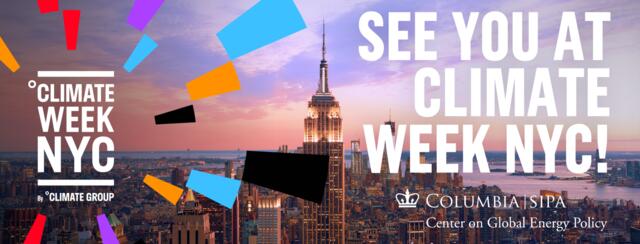
Center on Global Energy Policy Marks Climate Week 2020
SIPA’s Center on Global Energy recently partnered with Climate Week NYC 2020 to curate a series of virtual events that address climate change from a policy perspective. At multiple panel events, experts — including many of SIPA's own faculty and scholars — explored the policies, technologies and investments needed to rebuild the global economy after COVID-19, and to accelerate climate policy at the local, state, federal and international levels with a focus on U.S. leadership and policy pathways.
Several of the week’s highlights are summarized below, with links to archived video. Visit CGEP for its complete list of Center events, research, and other Climate Week resources.

September 21
The Impact of the Energy Transition on Global Health and Economic Prosperity
The global pandemic of COVID-19 has transformed the landscape for 2020 and beyond with drastic impacts on public health and the global economy. For many it has given pause for thought and provided a new perspective on how to tackle the other global crisis, climate change. Experts discuss the road to a cleaner system and brighter economic future.
September 22
Achieving a Net Zero Emissions Economy: Returning Carbon to the Earth
Carbon capture utilization and storage (CCUS) is vital to reducing emissions to net-zero by mid-century. To achieve this goal, we must go a step further and decisively embrace carbon dioxide removal (CDR) techniques. This high-level event examined the critical role of CCUS and CDR in a net-zero emissions framework and the value of a balanced carbon management approach to 2030—an important milestone on the way to the ultimate 2050 goal.
Green Recovery from COVID-19: Perspectives From Across the Globe
Around the world, countries are undertaking fiscal stimulus in order to accelerate their recovery from COVID-19. In some locations, governments are integrating into their stimulus programs investments designed to reduce greenhouse gas emissions and other pollution, increase clean energy innovation, create jobs, and provide climate solutions. This candid and far-reaching panel discussion on green recovery from COVID-19 explored various governments’ approaches to creating jobs and cutting emissions, shares insights on prospects for a green recovery and considers how economies can emerge from this crisis stronger and more sustainable than we were before.
September 23
Powering an Equitable, Sustainable, and Just Global Energy Transition
An equitable, sustainable, and just global energy transition will not be possible without the broad and equal participation and leadership of women in all aspects of the energy industry. Yet worldwide, the energy industry continues to be one of the least gender-inclusive segments of the global economy. Experts shared their contributions to the energy transition and engage in a candid discussion about the barriers to women’s equal participation that must be addressed in order to ensure a just and sustainable transition.
Energizing America: A Roadmap to Launch a National Energy Innovation Mission
New and improved clean energy technologies are critical for swiftly decarbonizing the global economy. The United States has an opportunity to accelerate clean energy transitions abroad and build job-creating industries at home by investing in innovation. With this program CGEP officially launched Energizing America, a roadmap to triple U.S. federal investment in clean energy research, development, and demonstration to $25 billion by 2025.
September 24
Environmental Justice: Climate, Health, and Energy
Climate change is already impacting the health of people around the world. At the heart of the challenge—and its solution—is the energy system, which currently produces not only the majority of human-produced greenhouse gas emissions but also the vast majority of key air pollutants that harm the health of communities around the world. The discussion looked at the impacts of climate change and air pollution on our health and considered how the energy transition can help to protect and improve human health moving forward.
Food systems contribute 21 to 37 percent of global greenhouse gas emissions, according to the best estimate. But food systems have received far less attention than power and transport systems in the global response to climate change. In this discussion, experts consider these issues with a particular focus on the opportunities to include food system measures in the updated NDCs that national governments submit to the UNFCCC.
As a center of research, teaching, and engagement on energy and environmental policy, Columbia University’s School of International and Public Affairs frequently uses its resources to address key issues related to climate and sustainability.
Through academic centers like our Center on Global Energy Policy and our Center on Environmental Economics and Policy, the School conducts leading-edge research and proposes innovative ways forward. In our Master of International Affairs and Master of Public Administration programs, including the specialized MPA Program in Environmental Science and Policy, we train the leaders of the future. And our robust slate of programming throughout the year convenes experts from around the world who provide diverse perspectives on current policy debates.